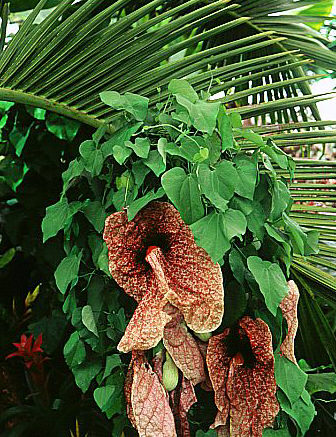Aristolochia macrophylla
Dutchman's pipe
A vigorous deciduous climber with broad, heart-shaped leaves to 30cm in length, and solitary greenish flowers 3-4cm in length, mottled with yellow and purple, borne in the leaf axils
Synonyms
Aristolochia siphoAristolochia durior

Buy this plant
Size
Ultimate height
8–12 metresTime to ultimate height
5–10 yearsUltimate spread
2.5–4 metresGrowing conditions
Moisture
Moist but well–drained, Well–drainedpH
Acid, Alkaline, NeutralColour & scent
| Stem | Flower | Foliage | Fruit | |
| Spring | Green | |||
|---|---|---|---|---|
| Summer | Purple Green Yellow | Green | ||
| Autumn | Green | |||
| Winter |
Position
- Full sun
- Partial shade
Aspect
East–facing or South–facing or West–facing
Exposure
Sheltered Hardiness
H6Botanical details
- Family
- Aristolochiaceae
- Native to GB / Ireland
- No
- Foliage
- Deciduous
- Habit
- Climbing
- Potentially harmful
- TOXIC if eaten. Wear gloves and other protective equipment when handling Pets (dogs): TOXIC if eaten - see the HTA guide to potentially harmful plants for further information and useful contact numbers
- Genus
Aristolochia can be shrubs or herbaceous perennials, many climbing, usually with heart-shaped or ovate leaves. Distinctive flowers have an S-shaped calyx tube and no petals, and are may be white, yellow, brown or maroon, often mottled
- Name status
Correct
- Plant range
- SE Canada to E USA
How to grow
Cultivation
This climber thrives in a sunny, sheltered position with a soil that is fertile and well-drained
Propagation
Propagate by seed or softwood cuttings
Suggested planting locations and garden types
- City and courtyard gardens
- Wall side borders
Pruning
Pruning group 11 or pruning group 12; prune after flowering
Pests
Generally pest-free
Diseases
May be susceptible to honey fungus in gardens where it is present but insufficient data to determine degree of susceptibility
Love gardening
Sign up to receive regular gardening tips, inspiration, offers and more
View our Privacy Policy
Get involved
The Royal Horticultural Society is the UK’s leading gardening charity. We aim to enrich everyone’s life through plants, and make the UK a greener and more beautiful place.